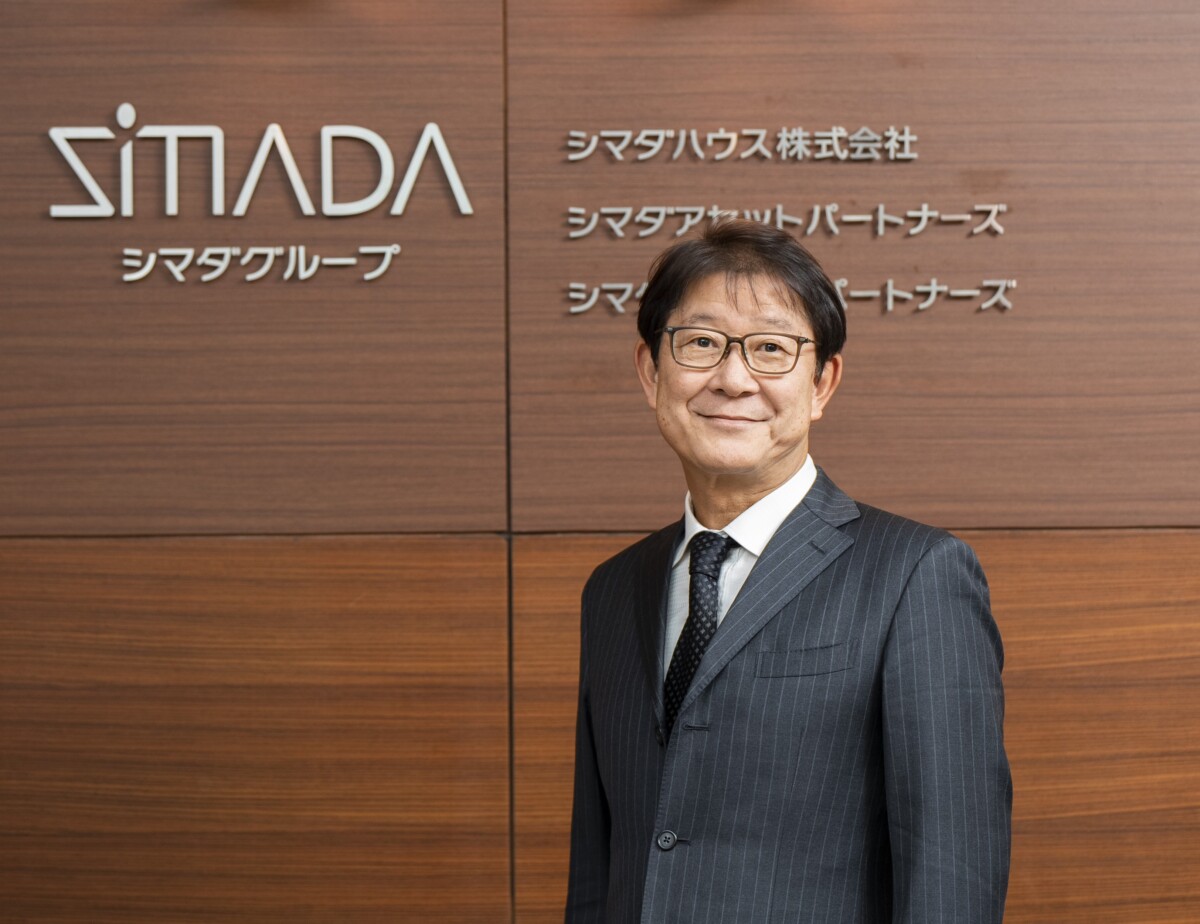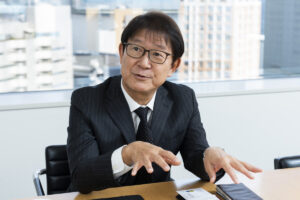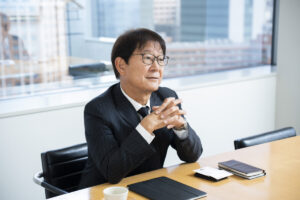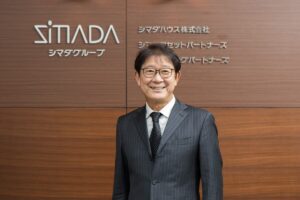Comments by donators
An international university like Sophia University creates leaders for the next generation
Mr. Narutoshi Shimada Representative Director and CEO, Shimada Group

Inspired by the international atmosphere of Sophia University, I traveled to the United States alone
The Shimada Group is engaged in a range of businesses including real estate, hotels, nursing care, and rice and restaurant businesses. In recent years, we started offering new services that combine different business forms, such as “bar and hotel” and “hotel and nursing care,” which have received positive feedback from many people.
The Shimada Group started out as a rice store founded by my grandfather. When I was a child, I was exposed to the many comings and goings in my house and because of this, the perception that “our family is running a business” was naturally formed in my childhood. I went to an all-boys school for junior and high schools in Kunitachi City, Tokyo, but since my parents were busy working every day, I had little memory of going on a family trip.

That is why the Yotsuya Campus of Sophia University was so inspiring. Whenever a state guest visiting Japan was invited to the State Guest House, roads around the campus were blocked and the national flag of the guest’s country was raised. At the time, international students were studying at the Ichigaya Campus, but still, an international atmosphere persisted everywhere in the university, and I loved that. In my freshman year, I joined an international cooperation group and participated in a short-term exchange program at Ateneo de Manila University in the Philippines. Those experiences showed me how enjoyable it is to interact with various people. In my sophomore year, I traveled alone to Colorado in the central United States and made my way through Texas in the South to the eastern state of New York.
Around that time, a civil war broke out in Cambodia, and 1.2 million people became refugees. Father Joseph Pitau, then president of the university, took to the streets himself around Shinjuku Station to raise funds. I was impressed by President Pitau’s actions and felt that he was teaching us the importance of acting with our own will.
Creating new value and services in a different form, even if the essence is the same
After graduating from Sophia University, I got a job at Nomura Real Estate Development. My father had set out on a new endeavor to develop ready-built houses, saying, “After food comes home,” with his newfound interest in building houses that serve as the foundation of people’s lives. Nomura Real Estate Development provided a wealth of experience, from sales of custom-built homes to the development of resorts in Kamogawa, Chiba prefecture, ski resorts in Hokkaido, and new businesses in Phuket. My experiences at Nomura Real Estate Development contributed immensely to my career, and I learned that if you say “I want to do this,” someone will remember it and your ideas will inevitably become a reality.

Being the eldest son in the family, I thought I would inherit the family business after gaining two to three years of experience in sales. However, my work at Nomura Real Estate Development was so exciting that I stayed on for eight years without realizing it. When I turned 30, my father finally said, “If you are not coming back, I will stop pursuing the ready-built housing business. What are your plans?” With this, I decided to return home.
Since I started running the company, I worked hard to develop businesses related to housing and rice, which the Shimada Group has long nurtured. When it comes to houses and condominiums built for sale, we sell what has already been built. However, if you rent them out on a two-year lease, they become rental houses/condominiums, and if you rent them out for a month, they become serviced apartments. Moreover, if you rent them out on a daily basis, they become hotels. In other words, the functions of a residence, such as providing a space for dining or sleeping, are the same regardless of whether it was built for sale or rent, or is used as a serviced apartment or a hotel—the only difference is who uses them, and for how long. If a ladies’ dormitory or a single dormitory has people living there for as long as 40 years, we might as well convert the dormitory into a nursing home. Then, what used to be a dormitory can be transformed into a share house or a nursing home for the elderly. Such ideas have been cast into shape, one after another.
“Hayama Umino Hotel Service Residence,” which was created with the idea that a nursing home should also be able to offer comfortable services like a hotel, opened four years ago and was quickly filled up with residents. We also created “Bar Hotel Hakone Koyama,” thinking that if there are kappo ryokans that combine kappo cuisine with ryokan services, there should also be bars that offer accommodation. Furthermore, based on the history of our company that started out as a rice store, we set our eyes on Pho, a representative dish of Vietnam that uses rice flour and water as basic ingredients, and launched Japan’s first Pho rice noodle specialty store “COMPHO.” We also incorporated “Yoshikawa Jozo,” a sake brewery in Isehara City that was about to go out of business, into our group to engage in sake making.
As such, we create new value and services by combining the functions of essentials—housing and food (rice)—and by offering them in a different form. We hope to further develop our company while continuing this metamorphosis (transfiguration/transformation) in the future.
At Yotsuya Campus, we can understand each other’s differences and help each other
Even after graduating from Sophia University, I have maintained a connection with the university through the Parents’ Association and donations. After my youngest daughter entered Sophia University in 2018, I served as a board member of the Parents’ Association for about four years. Today, I continue to donate to the university-led restoration work on the Western Causeway of Angkor Wat. This restoration is headed by Professor Yoshiaki Ishizawa, a respected and beloved former president, and has been ongoing for many years. Professor Ishizawa is a person who takes on all forms of challenges at any time, seeing them as his own affairs. By supporting his activities through donations, I realized once again the importance of continuity and connections with people. Leaders of Sophia University, including Archbishop Joseph Pitau and Professor Ishizawa, are friendly and level-headed. As a corporate manager, I am learning from their attitudes.
I have visited Angkor Wat for employee training. Similar to my childhood experience, when you are in the service industry or the restaurant industry, opportunities to go abroad do not come around often. Therefore, we make use of employee training to take employees overseas at the company’s expense.
Because Japan is an island nation and a disaster-prone country, a culture of mutual help has taken root in preparation for unforeseen situations. On the other hand, large continents like Eurasia have few disasters, yet conflicts occur everywhere. The devastation of Angkor Wat was also caused by a civil war, and territorial disputes still exist to this day in Eastern Europe and Western Asia. In such a dire global situation, we need leaders who will take the initiative to promote cooperation. In this context, I believe international universities like Sophia University will play a significant role.
Understanding each other’s differences, such as nationality, race, culture, and religion, and instilling such values as helping and building rapport with each other are what the modern international community needs. Sophia University, located in Yotsuya, central Tokyo, has much to offer in this regard, with international students gathering from all over the world and opportunities to help prepare students as they go out into the world. I expect the university to strive to produce many such leaders of the next generation.
When I entered Sophia University, I had a strong desire to “go abroad while still a student to make the most of student life at Sophia University.” It seems that few students have that kind of desire nowadays, even though they can only travel abroad for a long period while still a student. I hope that Sophia University students will actively go abroad and experience things that they can only do so now.
I also strongly encourage you to pursue the path of an entrepreneur if you have something you want to do. People who start a business for money tend to give up easily when things don’t work out; however, if you are driven by your resolve, saying “I want to do this,” you will be able to strive until everything goes as planned, and it will be easier to realize anything if you are at the top of the organization. I hope you will see and experience various things at the university and overseas and find what you really want to do.


